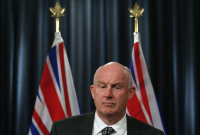Support strong Canadian climate journalism for 2025
British Columbia is the first province to begin legislating the United Nations Declaration on the Rights of Indigenous Peoples, a landmark international document on Indigenous rights.
The province is introducing a bill today that will ensure all provincial laws are aligned with the declaration (referred to in shorthand as UNDRIP), which will require Indigenous Peoples are included in all decision-making that impacts their rights.
The declaration also requires “due recognition to indigenous peoples’ laws, traditions, customs and land tenure systems,” which would therefore legally require the province to recognize Indigenous legal systems that have been long ignored.
The bill is expected to pass since the NDP-Green coalition government makes up a majority. And since the UN document itself is non-binding, legislating the document is a significant step to recognizing the rights of Indigenous Peoples.
While the bill includes many human rights people take for granted, it also takes into consideration the historical injustice, colonization, and dispossession that Indigenous Peoples have experienced in a province where children are overrepresented in the child welfare system and Indigenous Peoples are over-incarcerated.
The document protects Indigenous Peoples’ rights to self-government, and includes 46 articles with a wide range of protected human rights including safety from genocide and assimilation, access to education, representation in state-owned media, traditional ownership of territories and restitution for what has been stolen. Restitution is one of the sore points for some critics of the bill who think the declaration is unfeasible.
Perhaps the most famous article that has raised criticism from conservatives is Article 19:
“States shall consult and cooperate in good faith with the indigenous peoples concerned through their own representative institutions in order to obtain their free, prior and informed consent before adopting and implementing legislative or administrative measures that may affect them.”
Federal NDP MP Romeo Saganash introduced an independent bill, bill C-262, to legislate UNDRIP. But many Conservatives oppose legislating the declaration, including party leader Andrew Scheer, because they misconstrue the concept of “free, prior, and informed consent” as a veto on development projects like the Trans Mountain pipeline expansion. Saganash’s bill passed in the house but Conservatives blocked the bill in the senate.
B.C.’s provincial New Democrats campaigned on the promise of implementing UNDRIP in 2017, and after an NDP-Green coalition took government, the ministry of Indigenous relations and reconciliation began working with Indigenous Peoples on advancing the legislation. In February, Premier John Horgan promised B.C. would be the first province to legislate UNDRIP.
The government will introduce the bill at 10:00 a.m. PT in the legislature in Victoria.






Comments
Hurray!